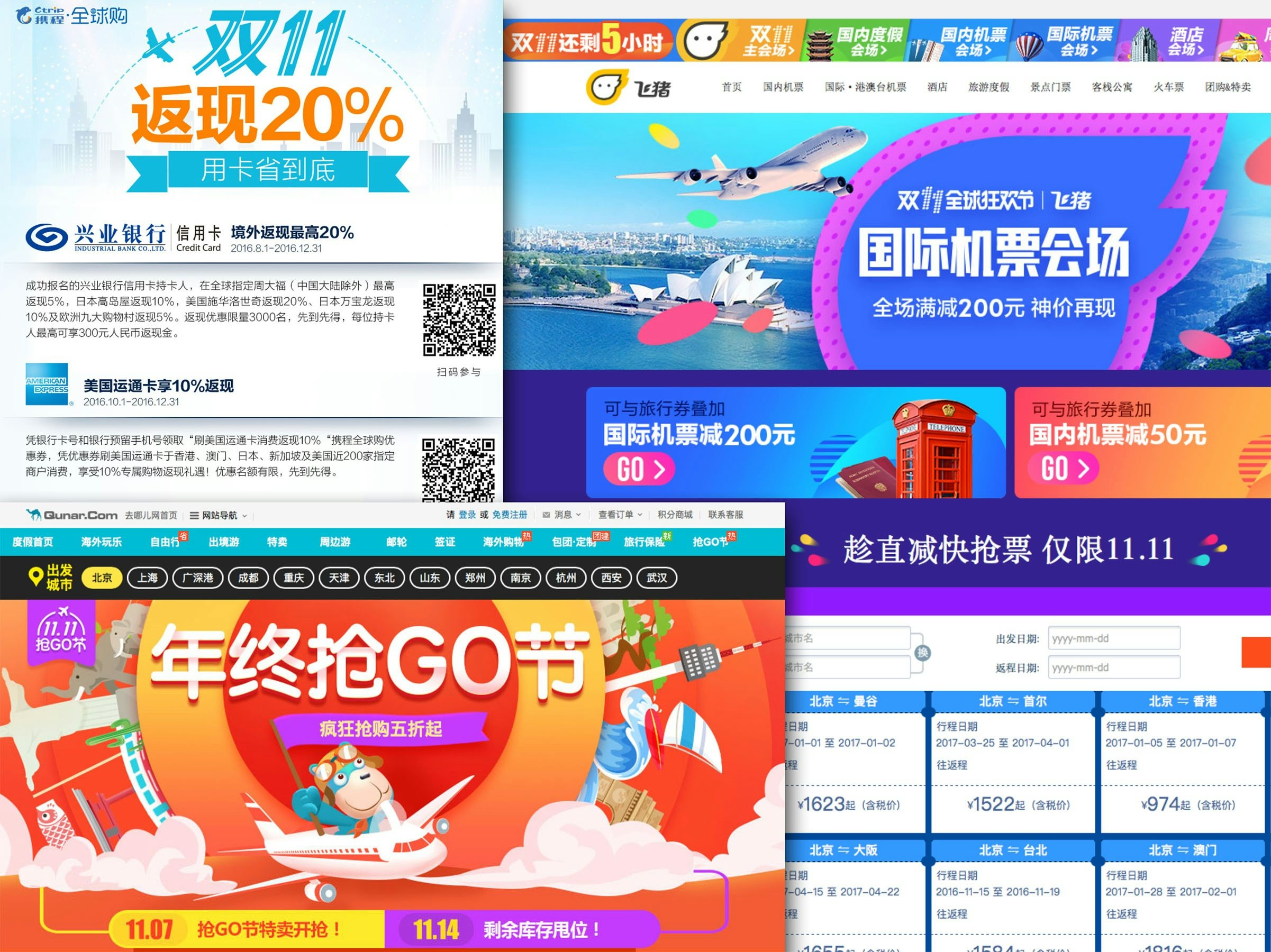Singles’ Day, the 24-hour shopping bonanza made famous by Alibaba and its increasingly elaborate Singles’ Day festivities, has come and gone—but what does it tell us about Chinese travel?
As Jing Daily previously reported, this year’s Singles’ Day broke another record by reaching a total transaction value of US$17.8 billion (RMB 120.7 billion) in the span of 24 hours. This number only accounts for Alibaba’s various online marketplaces, such as B2C platform Tmall, C2C platform Taobao, and its recently rebranded travel marketplace, Fliggy (formerly known as Alitrip). While international media attention mostly focused on the stunning value of transactions during this one-day event, investors were less impressed, and the Alibaba stock dropped by 1.4 percent. While Alibaba’s transaction volume alone shattered all previous records, growth had dipped from 60 percent the year prior to 32 percent in 2016.
In a webinar about Singles’ Day hosted by Jing Travel and China Luxury Advisors on November 11, one of the main reasons quoted for the slowdown in growth was Alibaba’s growing competition from other e-commerce platforms such as JD.com that are also trying to cash in on the Singles’ Day phenomenon.
While the larger share of Singles’ Day revenue is represented by sales of consumer goods, Alibaba’s travel platform, Fliggy, has become one of the main success stories of Singles’ Day in the last few years—and 2016 marks no exception. Transaction volume on the marketplace reached US$316.7 million (RMB 2.17 billion) during last week’s Singles’ Day, up from US$221.5 million (RMB 1.5 billion) in 2015. While growth on the platform reached nowhere near the 200 percent growth it saw between 2015 and 2014, the growth of sales of travel products still outpaced overall growth by a significant margin—in spite of growing competition.
And growing competition there is. Most, if not all, of Alibaba’s major competitors in the travel space ran Singles’ Day specials on their platforms, including industry juggernaut Ctrip and main rival Qunar. To add insult to injury, many travel service providers promoted Singles’ Day specials directly to customers using their own platforms instead of listing their special offers on Alibaba’s Fliggy—non-Chinese travel companies included.
The competitive landscape for travel companies on Singles’ Day doesn’t only underline the contested state of Chinese travel marketplaces, but also the increasing commoditization of travel products in China.
It has never been easier to purchase travel products in China, and the fact that you can go online, purchase flight tickets, book hotels, and then simply set off to an exciting destination would have been unthinkable less than a decade ago. However, the growing sophistication of China’s online travel agencies, an increasingly affluent Chinese middle class, and an ever-growing number of destinations that are visa-free or visa-on-arrival for Chinese visitors have entirely changed the travel market in China. Indeed, logging on to Fliggy on Singles’ Day and impulse purchasing a discounted flight to the United States would have been impossible only a few years ago, but on Singles’ Day this year, hundreds of thousands of people tried to do just that—even causing Alibaba’s servers to stop responding for brief moments. With the United States’ recently implemented 10-year visas for Chinese tourists, such visa holders could even buy last-minute tickets without worrying about practical problems.
Another important takeaway from this year’s Singles’ Day is the stunning number of transactions that were completed by mobile—82 percent of all Singles’ Day purchases on Alibaba’s platforms were completed on mobile devices. In 2015, this figure stood at 68 percent—an already impressive number. This further underlines that, in China, a mobile-first approach to the market is the only appropriate way to deal with online marketing. At 82 percent, the question is no longer whether mobile is important or not, but instead whether the desktop experience is relevant at all anymore. What percentage of purchases on Fliggy that were made on mobile devices has not been released by Alibaba, but Phocuswright forecasts that 60 percent of all Chinese travel bookings will be done by mobile in 2017.
With China’s Singles’ Day breaking new sales records for the eighth year in a row, and Alibaba’s many competitors taking on the incumbent for Singles’ Day dollars, another question is perhaps why overseas destinations and retailers have yet to fully embrace this Chinese shopping holiday. After all, Chinese tourists have embraced Black Friday, and overseas destinations have embraced Chinese New Year—but most have yet to make an attempt at cashing in on Chinese tourists on Singles’ Day. While some overseas retailers have made moves to offer specials during Singles’ Day, the tipping point for the industry as a whole still seems to lie in the future.
Don't want to miss out on anything important? Keep pace with the business of global Chinese travel by subscribing to the Jing Travel newsletter!
